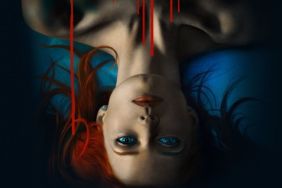Fans of director Terry Gilliam’s imaginative fantasy films such as Brazil, The Adventures of Baron Munchausen, Time Bandits and The Fisher King should be thrilled that the former Monty Python animator is back doing what he does best with his latest original film, The Imaginarium of Dr. Parnassus.
Most readers will probably have first heard about the project after the tragic death of one of Heath Ledger on January 22, 2008, after which the production shut down as Gilliam tried to figure out how they could possibly proceed without their primary star. His saviors came in the form of Johnny Depp, Jude Law and Colin Farrell who stepped into Ledger’s role as Tony, the smooth-talking but unscrupulous businessman on the run from the mob who encounters the roving band of performers led by Christopher Plummer’s Dr. Parnassus. In fact, Parnassus is an immortal who has been caught up in a centuries old competition with the Devil, played by singer Tom Waits, who is just days away from taking Parnassus’ daughter Valentina (Lily Cole). While Tony’s arrival might give the unfortunate crew an advantage in the contest, it also puts him at odds with Parnassus’ young liege Anton (Andrew Garfield) whose hopes of winning Valentina’s heart are dashed when she falls for the charming newcomer.
Besides reuniting Gilliam with Charles McKeown, who co-wrote Brazil and “Munchausen,” the movie has allowed the director to pull together many of the talented people he’s worked with on past films to create another lushly visual film that should appeal to fans of his earlier work.
ComingSoon.net had hoped to talk to Mr. Gilliam for many months, ever since he presented footage from the movie at Comic-Con in San Diego back in July, so we were glad that when we finally had a chance. It was a comfortable and relaxed interview that hopefully covered at least a little ground he hadn’t been talking about endlessly since the film debuted at Cannes.
ComingSoon.net: What’s really exciting for me when I first heard about this project was that you were once again writing with Charles McKeown, since I really loved “Brazil” and “Munchausen.” How did that come about? Was it very organic in that you wanted to do an original story?
Terry Gilliam: Yeah, we just (said), “Okay, let’s work together. We worked together for a long time, let’s see if we can’t work together.” He just said, “Ah, what do we do?” “I don’t know.” “Do we have a story, do we have a character?” “No.” “Okay.” (Laughs) That was kind of Day One and I never said anything. We had sort of half-formed in our head that we basically just started from the wagon arriving in town, a wagon from another time arriving in a modern city and this sort of extraordinary, ancient sort of act is on there and nobody pays attention. It’s just simply the idea that something wonderful turns up in town and people are too busy shopping or drinking. (Laughs) It’s supposed to be London.
CS: Had you ever approached a movie like that before where you didn’t have any specific ideas whatsoever going into it?
Gilliam: Nope. I mean, even something like “Time Bandits” came to me very quickly in a weekend. I suddenly had an idea that was very clear. It was a matter of writing it out, but at least I had an idea. This, we just sat down without an idea and it became… you just throw out some idea and that sticks, and then throw something else, or it didn’t stick. (Laughs) Little by little you start getting there. I think the other thing that I was thinking about was the fact that the kind of imaginative stuff that I do, but without the kind of financing everybody else seems to get. So I figured out this idea of the Imaginarium, this mirror, and we can go into a lot of different worlds very cheaply get in and get out before it gets too expensive. That kind of thinking went into it. (Laughs)
CS: So you’ve obviously worked with Heath before as well as Christopher Plummer and Verne Troyer, so were you actually thinking of them while writing the parts?
Gilliam: No, purely just write a piece, write it and see if we’ve got something in the end that feels like a story and this idea. When you get a script done, then I sit down. It’s always like that. I still don’t think I ever write with somebody in mind, you just write and then you, “Oh, okay. He would work, he would work, good, yeah.” It goes like that.
CS: There’s a lot of similar imagery and themes in it as some of your past movies, a couple of new things. For instance, the use of a quirky stage act, we saw that in “Munchausen” and before that in “Time Bandits,” they kind of put on a stage act. Things like that kind of keep on popping up.
Gilliam: I’ve just, I’ve got one idea, that’s it. (Laughs) This is it obviously. I mean, I was actually, I kept saying compendium, compendium I kept saying, “Okay,” “Franny and Alexander” for Bergman, “Amarcord” for Fellini. They were all films seemed to be, they just reached a point in their life where they just relaxed. “Well, I’ll just do the things I like to do and the things that gave me joy and made me smile.” That’s what those films struck me about there, but I think that was kinda my approach. I can never get beyond these theaters or freak shows which I always loved, they’re magical for me. When the circus used to come to town there was all those great canvas hoardings outside with the three-headed woman and the man who wiggles at his belly like a snake and all that sh*t and I said, “That’s the kind of thing we should be doing.” (Laughs)

CS: You mentioned trying to figure things to make the movie cheaply, but you shot a lot of this in London. How did you manage to get things like the caravan driving through London? Did you just do it all early in the morning?
Gilliam: It was at night. I thought at the time, “Ah, it’ll be great. We got a little wagon. We can take it everywhere, it’ll be cheap. We’ve got control over it,” and it was a nightmare ’cause the wagon, it’s built it doesn’t make any sense that way. I mean, the physics, (Laughs) it’s too tall, it’s too everything and it’s too lopsided with the stage. So, we had to have different versions of it where we had staged where it was open was one thing, and then it’d be closed up with a lightweight business. To get the horses to pull it, it turned out we had to gun it to get the horses on. Then, we had to make it strong enough so that we could get actors on top of it when we were going through the streets of London. It was a nightmare. So like, nothing was simple. London was a lot easier than shooting in New York one would think. We were very lucky in a lot of situations. It’s like, the fairground in the second scene there where we had Tower Bridge which is lit already so we don’t have to pay for the lighting. (Laughs) We built our little fairground and it just happened it was at Christmas time and there was a German fair along the Embankment so the second Ferris wheel is not ours. The second set is not ours. (Laughs) It’s like so yeah, all that stuff we were lucky.
CS: I’ve been following your work since the “Python” days and I feel like this movie best captures your animation style and does a live version of that. When you were writing with Charles and you had ideas and maybe did some drawings, did you have any idea how you were going to realize some of it?
Gilliam: I don’t quite know how to do this stuff. It comes very naturally because I’ve got my own FX company and someone will build us a model and it’s kind of like what’s the best, most pragmatic way of achieving it? So a model is better in some instances; CG works better in another. My other theory was by not trying to be naturalistic we could do it cheaper clearly because except for the snake, there’s no creatures that animate and need to do things. So all these are thought out to save money, ’cause I know I can only ever get X amount of money for my stuff. So “Okay, we gotta work within that,” but CG was really good because especially like the stuff with the ladders, it was all based on Grant Wood’s paintings. It was very simple breast-like hills and simple trees, and I thought, “Well, CG does that really well,” and you couldn’t build them. Even when we built models like that when we did “Munchausen” in the scene where Eric is running off, the high-speed runner takes off and we built models that actually looked like that. The advantage of CG is you can swing the camera around more easily. Once you’ve built a 3-D environment you could go all over the place. It’s great, yeah.
CS: In “The Brothers Grimm” you ended up building a lot like the forest scenes.
Gilliam: Yeah, it was models. It was actually models within CG trees extending the forest. But the heart of the thing, the tower and all that is all models.
CS: Wow, I never realized that. I wanted to jump ahead a bit because you mentioned not having sort of money to make this. Have you not found a single person within the studio system who is a fan of your work and gets what you’re doing who wants to help you realize your vision?
Gilliam: Nope, and the ones that did are all out of jobs. (Laughs) I mean, the studio system now is really getting bad because, you know, they’re laying off people and who they tend to lay off are the guys that have a better understanding of films and audiences and the bureaucrats remain behind. That’s what seems to be happening. And, if you look at what happened at Warner Brothers how Picturehouse disappeared and New Line, all of these things which had a better touch as far as I was concerned, about films, and they’re all gone and just a few people are left and they’re, you know, they’re the business guys, they’re the bureaucrats.
CS: Spike Jonze and “Where the Wild Things Are” is a good example. They threw a lot of money into that obviously maybe for better or worse in order to allow him to realize his vision.
Gilliam: They spent a lot of money on that. I mean, huge. Three times what we spent probably. But Spike is… I think, I mean, he’s not a bad boy. I’ve got a reputation, which I don’t think is deserved, but Hollywood is happy to live with that and I think I’ve got a perverse side that quite likes it because if anybody’s stupid enough to believe that, then I don’t want to work with them. (Laughs)
CS: Watching “Brazil” now, one thing that you quickly realize is that Sam Lowry is you, facing all these obstacles in order to achieve your dreams and when you watch this movie, most will assume that Parnassus is you.
Gilliam: Yeah, well, it’s much closer, I mean, yeah because, you know, I’m sitting there. When I decide to wallow in self-pity I can say, “Well, nobody likes my film. I don’t have a big audience. I don’t reach the people Spielberg reaches,” because anybody does this. I am trying to please myself, but I’m trying to reach a large number of people and I always have a much smaller audience. Sometimes I’m lucky and get a big hit, but it’s, you know, it’s just what it is. I was kind of we started the thing like “Tideland” which was never meant to be a popular film. It wasn’t even seen by anybody. At a certain point you just get tired and you say, “Okay, let’s write about what it feels like to be old and miserable and nobody liking what you do.” One can wallow in self-pity very easily if you let yourself… so I did for a while. (Laughs)

CS: Well, it makes for a very entertaining movie.
Gilliam: Yeah. (Laughs)
CS: I just talked to Christopher Plummer last week and this is a a really, really amazing role for hime.
Gilliam: He’s fantastic because he gets to do there’s a bit of Prospero, there’s a bit of King Lear, there’s anything. I was really aware of that and even the relationship with his daughter Amanda, he’s able to play with, you know, Parnassus and Valentina. He’s great. I hope, I hope people I hope he gets the recognition he deserves because I think he’s extraordinary.
CS: What brought you to the idea of Tom Waits playing the devil? I asked before about writing for specific people, and you really can tell anyone “Tom Waits is playing the devil” and they immediately will buy it sight unseen.
Gilliam: It was a really easy one and the funny thing was that we were thinking about who (to play it), going around in circles, and what really happened was this Dutch animator was trying to get me to get in touch with Tom to see if he’d do a voiceover in his animation and I sent the material to Tom and he said, “Not interested, but got anything going for me?” I said, “Well, the devil.” Bingo, and he said “yes” without even reading the script, he was just “Yes, I’m on board.”
CS: Well, that’s a good point because you mentioned your reputation but actors like Chris and Heath (and Tom Waits) obviously want to work with you. These are people who really love your work that want to work with you, so is it hard convincing actors like them to do another movie with you?
Gilliam: No, Chris was immediate. I’m actually lucky with actors, that’s the good thing. I think everybody I’ve worked with has enjoyed working with me so they’re willing to come back and there seems to be a lot of other people that are willing to throw themselves into the pit with me (Laughs) for whatever reason. I mean, I do think when you look at my films, the actors all come out really wonderfully. I do think I’ve got a good sense for acting and I think I provide a good playpen to play within.
CS: Of course, the big tragedy of this of course was Heath passing away in the middle of production. It must’ve been really tough getting back up and going. Was there any point where you were going to say, “Okay, I’m going to give up and just not continue?”
Gilliam: That’s what any reasonable man would’ve done. (Laughs) But again, the other thing I do when I’m making movies is surround myself with really good people who don’t listen to me. That’s crucial, so that someone like Amy, my daughter who… this is a sort of novice producer coming into this thing. This is really her first production probably. Nicola Pecorini, DP. They just said, “Come on, you bastard, get off your ass. We gotta solve the problem, because we’re not gonna let Heath’s last work disappear.” I mean, yeah, I just packed it in. I just had run out of energy. I just thought, “Oh God.” I mean, it was a complicated thing because on the one hand I’m thinking, “Your film isn’t gonna get done. You’ve spent years on it.” But that was the secondary thought. The first was just, “Heath is dead,” and I was trying to actually come to terms with that ’cause he was really close. I mean, he was just this is the guy. I could easily have done any film I wanted to do in the future with Heath. We just clicked so good. And to be that young and suddenly it’s gone. Only two days after we’d gone… me to Vancouver and him to New York – and he’s gone. It’s one of those things. It’s like Bill Vince, the producer, he died as well, but he died at the end of the film and he had cancer through the whole thing and I always knew Bill would be very lucky to survive the film. So, Heath was like, where does this come from? (Laughs) I mean, Heath was young, full of life, energy, great… and bang, he’s dead.
CS: I remember I was in Sundance when I got an Email about it literally right before a screening and I was shocked, and thought “What happened there?” It was very hard to believe.
Gilliam: No, I was convinced it was the marketing people from Warner Brothers, it was a stunt to push the Joker.
CS: A lot of people thought that at first. Obviously you had to change some things, and it was tragic, it worked out brilliantly to have these other actors step into the role.
Gilliam: It was actually incredibly easy. Once I made the leap… because it was already set up in the script that if you went through the mirror with somebody else, their imagination may be stronger than yours, so you could be what they’re dreaming about. I mean, it’s an easy step to say, “Okay, they don’t look like Heath anymore.” But the difficulty was not making that leap, the leap was to say we could fix it and we wanted to carry on, that was the hard part. But that’s it. I mean, a couple scenes aren’t in there, but we don’t need them. That’s why I always said that Heath was co-directing this thing posthumously because he created the situation that I had to find other actors to take over. I had to cut certain scenes out which haven’t hurt the film at all, they helped it. (Laughs)
CS: Had you shot any of the Imaginarium stuff at all or was that all gonna be in Vancouver?
Gilliam: That was all Vancouver, yeah. There were several scenes that were this side of the mirror that weren’t shot but I could get around those without Heath and we did. I moved one of the scenes to the other side of the mirror. It’s the scene with Andrew and Jude after the dancing policeman and the head flies away, it’s the scene where Tony, Jude says, you know, “Do you work for these Russians? They laundered the money and it was laundered money.” That was originally supposed to take place with the rest of the troop in the wagon and in fact it’s better by being just the two of them ’cause then Anton says, “He’s not who you think he is,” and Valentina could say, “Come on, you’re just jealous.” It works much better. But all the dialogue is exactly the same. We didn’t change anything. That was all written. I think what I did, a new line just for example: when Johnny appears and the Louis Vuitton woman, Maggie Steed goes, “Ah, I always dreamed you would look like this.” That’s a new line because that just explained it perfectly. (Laughs) And that’s about it. There’s a few little things like that, but everything else, what appeared to a lot of people to be a eulogy about Heath with Princess Di and James Dean and all that “staying forever young, not growing old and fat.”

CS: That was always in there.
Gilliam: All of it written, everything, yeah.
CS: Also, I read that you did a lot more improv in this movie than in the past. Was that also based around Heath?
Gilliam: It was just Heath. He was so playful and it was improv. It’s not like, “Oh, let’s just redo the scene.” The scene was always the same, but he was throwing in lines all the time that weren’t there and he was so good at it and I said, “Well, just let it ride.” That allowed Andrew (Garfield) to start improvising. He came up with some wonderful stuff and Tom. Christopher didn’t. Christopher adlibbed nothing. He’s a pro. He stays in his character. (Laughs)
CS: How much hand do you have in the marketing of your movies these days? Do you like being involved with it or is that something foreign that you prefer leaving up to the studio?
Gilliam: Well, probably it’s now that by the time… especially this one, I’m so finished and worn out and I don’t… “Okay, do the poster and all this stuff.” It’s more, I keep saying, “Let’s not do,” not about what we should do. I just kind of run out and I want somebody to come up with fresh ideas ’cause I know what we’re doing and in the past I’ve designed the posters, done all of that.
CS: Have you always designed the posters? Did you do that one over the one for this movie, too?
Gilliam: No, no, I mean, it sort of came out of some of the stuff that was being done in England and then they came up with that.
CS: As soon as I saw the new post, it immediately reminded me of “Munchausen.”
Gilliam: Yeah, and some of the other ones, the French one is very good. The Japanese one is excellent. The British one I didn’t like. Yeah, I thought that was okay ’cause it was fresh. The mirror is central. You know, it’s telling a story. You’ve got Parnassus, you’ve got the devil, you’ve got this wonderful world inside the mirror. You’ve got a love story. So, that’s it. (Laughs)
CS: I want to ask about “La Mancha.” A lot of people saw the documentary so we know all you went through to get to this point where you’re getting ready to try to make it again. We know that you’re interested in getting Robert Duvall to play Don Quixote and he wants to do it, so what’s that like going back into that again? Have you put enough time behind your last attempt that you can go into it fresh?
Gilliam: The good thing was that I didn’t look at the script for seven years while it was tied up in the French legal system. We got it back and I read it and I’ve done a major rewrite so it feels like a fresh movie to me. I mean, yeah, it’s a much better script than it was because at that point I was so busy just pushing it to make it happen and there are a lot, a lot of things, that when I looked at it now, I don’t like the character. It’s not that I don’t like him, I don’t know why he’s an ***hole. I mean, there’s a lot of stuff. It’s a much better, clearer idea, but at the same time, two thirds of it are exactly the same as it was before. It just means something different now, so it feels fresh. Johnny’s out of the picture because he’s busy swashing and buckling and Tonto-ing, so it’s really like starting anew. Duvall, when I sent it to him, he responded with such enthusiasm. I thought, “Fantastic, Bobby Duvall excited about playing this. That will be great.”
CS: Have you seen “The Road” yet?
Gilliam: I haven’t seen “The Road.” I’ve seen “Get Low,” this is the one with Bill Murray. It was in Toronto. It’s very good, and he’s wonderful.
CS: He’s brilliant in “The Road” as well.
Gilliam: Is he?
CS: And he can ride a horse, which is probably a good thing to have going in.
Gilliam: Yeah, and he tangos. (Laughs)
CS: With all the development and work you did the first time around, are you going to start from scratch or is there anything you can still use?
Gilliam: (whistles and motions as if it’s all gone) No, I mean, a lot of the locations I was using I’m gonna use again, but everything we had, that film is dead. (Laughs) It’s a new film. It’s probably a better way to do it as well. I suddenly realized, I was looking through my old location photographs and realized, “This is actually the fourth attempt to make the movie.” I’ve been at it a long time. I kinda just want to get it out of the system. I’ve gotta do it while Duvall is still riding a horse.

CS: It seems like all the best movies take a long time to make. It must be really frustrating as a filmmaker to have spent this much time on anything, but it feels like there are so many great movies that come from out of nowhere that the filmmaker has been trying to get made for ten years.
Gilliam: Sometimes it might not work. That’s what frightens me. With “Lost in La Mancha” out there I kept thinking that everybody having seen that will have their own idea of what the film should be like and I can only disappoint a lot of people because their imagination might be better than mine. (Laughs) So that’s why what I’ve done mentally is just say, “New film, different, let’s go.”
CS: You talked about doing a rewrite. Do you often or ever go back to any of your old movies and watch them? I’m sure you’ve been a part of many retrospectives over the years and you must watch them again to talk about them.
Gilliam: Well, I can criticize a lot of the stuff, but I have no desire to go back and alter history.
CS: I’m assuming many of your films haven’t been released on Blu-ray yet…
Gilliam: A lot of the stuff now is. I mean, it’s happening really fast and “12 Monkeys” is out. Do they send me a copy? No. No, no, and the world just sort of marches on when you’re in that system. You would think they would just have the decency to say, “We’re putting on Blu-ray a version of your film, would you like a copy?” Nope.
CS: Well, you would think they’d want you to be involved in the transfer…
Gilliam: (shaking head) We’re talking about bureaucracies at work. (Laughs)
CS: I have to tell you that I bought a DVD player so that I could watch the “Brazil” Criterion DVD.
Gilliam: Yeah, it’s fantastic.
CS: I just got a Blu-ray player and I’d love to be able to know that there’s a Terry Gilliam approved Blu-ray of “Munchausen” or “Brazil” out there.
Gilliam: There is a Blu-ray of “Munchausen.” Sony were very good, they did a 20th anniversary one and they did a documentary about all of us who are still alive, and it’s very good. The guy who handled this documentary really did a good job. On that one, I was actually involved in overseeing sort of the grading on it. I did most of it and then I got tied up in this film and there’s a couple scenes–because I trusted them at that point–that aren’t as good as they should be. I just think they’re not graded right… gnashed teeth… but yeah, they did it, a special 20th anniversary, yeah.
CS: I literally just got a Blu-ray player so I haven’t even been looking.
Gilliam: Yeah, I think there’s a “Fear and Loathing” out there now, but the thing with all of that, with Hi-Def or Blu-ray, you’ve gotta go and look at the movie because you find all sorts of things you don’t want to see. It’s like the Criterion HD version, they had to paint out wires on the flying model. The problem is you’re going straight off the negative and the negative has more information than you can imagine because by the time you do a print of it, just print from a negative, you’ve lost a lot of detail. When you do this stuff digital, you go straight from the negative and everything is revealed. They did an HD version of “The Thief of Bagdad,” and the flying carpet, there’s 27 wires holding it up. It just ruins it. “Oh no, don’t do that.” I mean, “Oh, but it was there on the original film.” “Yes, but it was never meant to be seen, you ***hole!” (Laughs)
CS: That’s funny. There’s a lot of filmmakers who are embracing digital technology. Some of them are looking into doing stuff in 3D. Have you been looking into that at all?
Gilliam: 3D doesn’t interest me at all*, but I don’t want to ever see film projected again, I want to see the digital projection. Digital projection is so much better and it’s getting even better. I saw “Parnassus” in 4K. Everyone knows it’s Sony and it was just… it was like 3D to me. It was so vibrant, it just lept off the screen, but I have no interest in the grain, I have no interest in the scratches, all the dirt you get on with film. Digital projection. I still shoot on film and then go digital, especially digital grading. I have control over the shots because when you’re shooting a film you’re always under pressure… at least mine are, we’re always under-budgeted and under schedule, so mistakes are made in the lighting. You can go in there and pull out that black area. You can pull up and discover this detail. Oh, you can hold that just dealing with one part of the frame, this is something you could never do grading on film. You grade the entire frame, and so it gives you a lot of room to improve as well.
CS: The 40th anniversary of Python was recently, and to see all of you on TV together was just amazing. Had you guys had any conversations about doing something else besides that, or was that pretty much it?
Gilliam: No, no… We did a thing in London which was Eric has written this oratorial called “Not the Messiah” which has been playing around the States a bit in a few places with his symphony orchestra and a 100-voice choir and four opera singers. It’s just the presentation of that, no acting. At the Albert Hall in London, Eric put it on a month ago and he got Mike Palin, Terry Jones and I all performed on it as well, so it was sort of a 40th celebration.
CS: But nothing till the 50th probably, if anything.
Gilliam: I don’t think so. But that’s actually gonna come out on DVD at some point that show.
CS: You said you haven’t had a chance to see a lot of movies. What kind of movies do you like to watch and what’s the last thing you saw that you liked?
Gilliam: I can’t think of any. I don’t watch that many. What’s the last thing I saw? I saw some at the Toronto Film Festival, that was it. What did I see? “Get Low.” (laughs) I think “Ondine,” Neil Jordan’s film. I’ve really gotta go and start watching movies again. I go through periods where I just don’t want to watch movies. I’m bored with them, they don’t surprise me. I saw “Up.” Okay, “Up,” it’s hard to criticize “Up,” it’s lovely. It’s beautiful, I love Pixar’s work. But it’s a puppy dog film, you just love it. It’s sweet, it’s big-eyed, you just love it! And yet, I don’t have much of a memory of it. I have more of a memory of “WALLE” because I thought “WALLE” got into something a little bit more socio-ecological statements, so I thought it was wonderful. But I think Pixar and the Coen Brothers, that’s it, that’s kind of my limited viewing.
That was the end of our official interview, but after the tape stopped rolling, we continued to talk about a variety of topics. He told me how he’d really like people to consider bringing older kids to the movie, because he always envisioned “Parnassus” as an all-ages experience and that the kids who have seen the movie seem fascinated by the whole thing. *We also talked a little bit about the expectations for James Cameron’s Avatar (which had yet to be seen at the time of the interview) and more about 3D technology and the problems he has with it, particularly with the glasses and the fact they reduce the whites, which throws off the contrast. We also continued to talk a little more about Spike Jonze’s Where the Wild Things Are and how he was able to make that within the studio system. Obviously, one could speak to a filmmaker like Gilliam for hours and not run out of topics, so hopefully we’ll see him with another movie sooner than later.
The Imaginarium of Dr. Parnassus opens in New York and L.A. on Christmas Day, December 25, and then expands to more cities on January 8.









